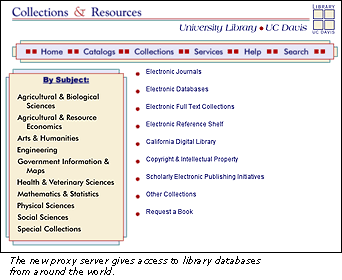|
|
Electronic Library Resources Now Available Anywhere
|
|
|
|
Electronic Library Resources Now Available Anywhere
|
|
|
In February, the UC Davis General Library rolled out its Proxy Server Service to allow faculty, staff, and students to access online library resources from a non-UC Davis Internet connection. Until February, UC Davis affiliates connecting through an Internet Service Provider (ISP) could only access the Melvyl Catalog, the Periodicals Titles catalog, and a few select electronic resources on the library's Web site. Those connecting to the library Web site from one of the UC Davis Modem Pools or from a computer on campus (i.e., dorms, offices, computer labs) received full access to library licensed electronic resources. After years of effort to merge Kerberos authentication and proxy server technology, Gail Yokote, Director of Library Services and coordinator of the Proxy Server Service, says that the technology is finally "more mature and stable." Now, a simple adjustment to your Web browser will allow the library Web site to recognize you as an authorized user when you connect through an ISP, thus opening up a world of electronic resources which can be accessed from virtually anywhere in the world. 
How To Use the Proxy Server Service
To use this new service, you must first have a valid LoginID and Kerberos password. To test your LoginID and password, go to https://mothra.ucdavis.edu/services/. To obtain a LoginID and password, go to http://mothra.ucdavis.edu/UCDLoginID/acquisition.html.Once you log in, you can read the instructions for configuring your browser to accept proxy server service at http://www.lib.ucdavis.edu/libinfo/computers/proxy/. If you need help, reference librarians are ready to assist you through the online form at http://libcf.ucdavis.edu/reference/proxy/index.cfm or in person at the Information and References Desks located throughout the library. What the Library Can Offer
You may not know that the library Web site (http://www.lib.ucdavis.edu/) is host to approximately 3,000 electronic journals and 120 databases which cover almost every imaginable field of study. As Yokote says, "The proxy service benefits all eligible UC Davis individuals." The key is realizing the gold mine available to all types of researchers, from graduate students and faculty researching from home to undergraduate student or staff inquiring about a particular subject.Opritsa Popa, a Reference Librarian for the Arts, Humanities, and Social Sciences, calls Academic Universe (also known as Lexis-Nexis) "the most useful database for students" but remarks that its extensive resources are of use for anyone: it has full text coverage of daily news from a variety of newspapers and journals, as well as numerous other legal and business resources. Other electronic databases can be accessed at http://www.lib.ucdavis.edu/databases/index.html alphabetically or organized by subject. On the other side of the coin, Vincent Caccese, a Reference Librarian for the Biological and Agricultural Sciences, highlights electronic journals such as Science, which has full text articles going back to 1997. He also recommends the Annual Reviews, which give a general overview of many scientific fields and are "good because they go back quite a ways and you can search all [of them] at one time through a single search engine." The 3,000 plus electronic journals may be accessed from the library home page and are split into two subject areas (Arts, Humanities and Social Sciences, and Sciences) at http://www.lib.ucdavis.edu/resources/ejournals.html. |
|
|